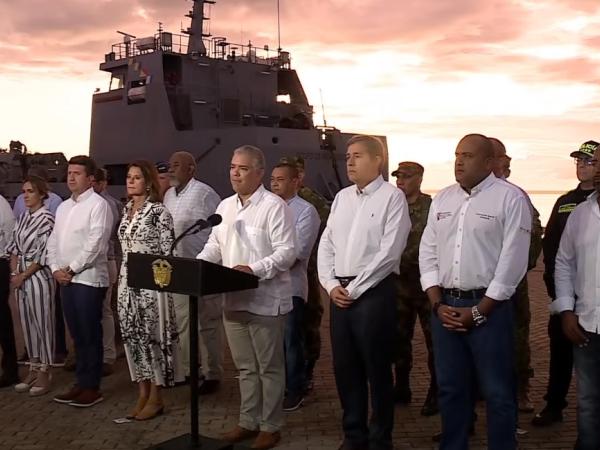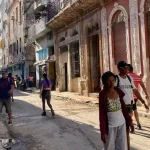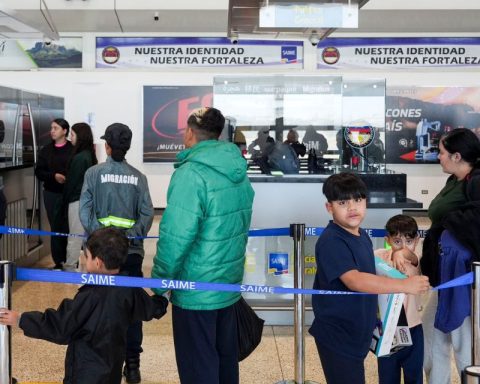After the ruling issued by the International Court in The Haguein the border dispute with NicaraguaPresident Duque accompanied by several officials from his cabinet spoke about the decision and said that “Our interest in defending this historic and indivisible Archipelago is clear, as well as the rights of the Raizales and of all Colombians.”
(Court notes that Colombia “violated the sovereign rights of Nicaragua”).
President Duque also assured that his government will not allow Nicaragua to limit the rights of Colombia in the Caribbean Sea, nor those of the Raizal community of the San Andrés and Providencia archipelago.
Duque reacted like this after hearing the new ruling of the International Court of Justice (ICJ) that considered that Colombia has violated Nicaragua’s “sovereignty and jurisdiction” in its own Exclusive Economic Zone (EEZ) by authorizing fishing activities in Nicaraguan waters, and ordered it to “immediately cease” his conduct. (Read President Duque’s full statement.)
“My Government, until next August 7, will continue with the superior task of preventing Nicaragua from limiting or attempting to limit Colombia’s rights.”said Duque in a statement to the country from the island of San Andrés.
My Government will continue with the superior task of preventing Nicaragua from limiting the rights of Colombia. Our obligation is to defend the sovereignty and the highest interests of the country in the Caribbean Sea. Faced with this responsibility there is not, there cannot be, hesitation or ambiguity. pic.twitter.com/yIfrXAYJ2c
– Ivan Duke ?? (@IvanDuque) April 21, 2022
Minutes before, Colombia’s agent before the International Court of Justice (ICJ), Carlos Gustavo Arrieta, had said that the ruling in which the court required Bogotá “Immediately cease your behavior” in Nicaraguan waters in the Caribbean actually allows the country “maintain freedom of navigation in the area and the presence of the Navy.”
Speaking to journalists upon leaving the ICJ, Arrieta explained that in the verdict of this court there was “a small scolding for some operations of the (Colombian) Navy in some area”but understood that the court “he considered that they were not major violations of international law and did not attribute any consequence to them” for Bogota.
“We have achieved what is essential for Colombia, which was to maintain freedom of navigation in the area and the presence of the Navy, maintain the integrity of the archipelago, and recognize the Raizal community so that it could fish in the area. We left very happy.” assured.
Regarding the court’s proposal to both parties to seek bilateral agreements on the situation of the Raizal communityso that it can access and exploit its traditional fishing banks in Nicaraguan waters, Arrieta pointed out that it is “Political decisions that have to be made are government decisions.”
“We are going to analyze the sentence in great detail, to see what it says, and we will proceed according to that”he underlined.
The ICJ considered today that Colombia has violated Nicaragua’s “sovereignty and jurisdiction” in its own Exclusive Economic Zone (EEZ) by authorizing fishing activities in Nicaraguan waters, and with its “interference with the marine and fishing scientific research activities of vessels with a Nicaraguan flag or license and with the operations of naval vessels. in Nicaraguan waters.
With this, the UN Court demanded that Colombia “Immediately cease your behavior” both with regard to its fishing activities in Nicaraguan waters, and its interference in research operations by Nicaragua in its own waters.
“It does not order us to cease our presence in Nicaraguan waters, that is not true, what they said is that we could not carry out environmental control operations because they were powers of Nicaragua, but they never ordered us not to be present or to leave the area. never, nowhere”interpreted Arrieta.
The ruling, he added, maintains “the possibilities of the Colombian Navy being there and carrying out operations to fight organized crime in the area.” In addition, the court considered that the Colombian presidential decree that established an “integral contiguous zone” from the continent to the archipelago, in which the delimitation established by the ICJ in a previous ruling of 2012 is omitted, “does not conform to customary international law”.
BRIEFCASE
With information from EFE


















